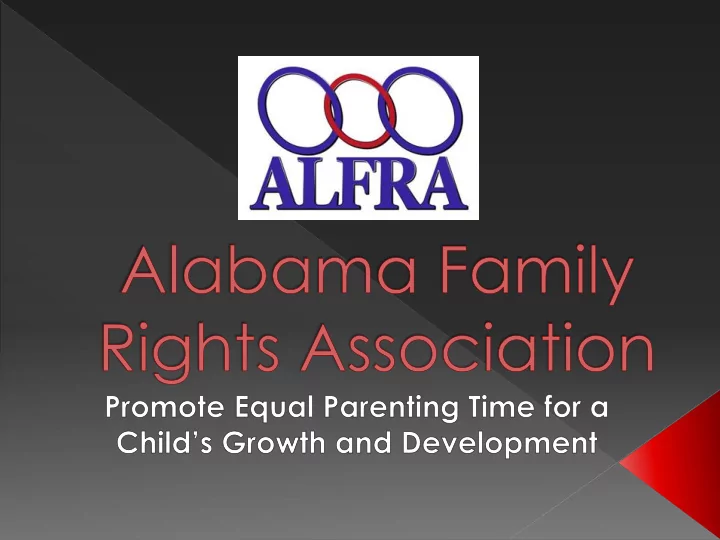

Background: Many are unfamiliar with the language in Ala. Code § 30-3-150. “It is the policy of this state to assure that minor children have frequent and continuing contact with parents.” Problem : “frequent and continuing contact” is not clearly defined. Courts consider “frequent and continuing contact” to include only 1 hour per week, 48 hours twice per month, or possibly equal custody. Without a clear definition, 5 different judges with the same information may result in 5 different rulings.
The scientific data • indicates that when both parents are involved in a child’s life, the outcome is measurably improved. A child whose parents are • not engaged and involved in their upbringing and care is a child “at risk.” With the absence of either • parent, a child is placed “at risk.”
We are all familiar with the phrase that a child is “from a broken home,” meaning the child is from a home with one parent. Using social science data over the course of more than 40 years, 112 Social Scientists indicate that children spend a lifetime trying to overcome the tragic circumstance of being raised without one of their parents.
Children from single parent homes account for… 85% of Youths in Prison 71% of School Drop-outs 71% of Teenage Pregnancies 90% of Homeless and Runaways 75% of Drug Abusers 63% of Youth Suicides Clearly, moms and dads are important, and children are more successful when they have both.
According to AL DHR, these children are… 5 times more likely to live in poverty 3 times more likely to fail in school 2 – 3 times more likely to develop emotional and behavioral problems 3 times more likely to commit suicide
They ensure the well- being of their child by… Developing a parenting plan that preserves and promotes equal and shared parenting. Pledging to foster an environment that makes their child[ren] feel safe. Agreeing to make important decisions about the upbringing of their child together. Using their resources to ensure that they interact in a healthy way under the circumstances of no longer being in the same household.
Each parent will provide a safe place with healthy food, clothing, and shelter. The child will be a part of each parent’s life and have the opportunity to associate with the extended families of each parent. As the child moves between his or her two homes, there is minimal disruption and few things that must travel between. The time of exchange between parents is caring, respectful, and supportive.
A child has a fundamental right to spend time with his or her parents. A child has a right to live in a protected status where his or her parents and community protect his or her right to live in an “unbroken” status. The parents’ marital status may no longer place him or her at risk, subject him or her to poverty, or condemn him or her to a lifetime of disadvantaged learning.
Share the educational progress of the child with both parents. Teachers assume and expect that both parents need to know how the child is progressing, as both are responsible for their child’s best outcome, which is to become a capable person. Schools promote this healthy communication between teacher, mom, and dad — and between parents and child (iNow Parent Portal).
Judges must document the rationale for all decisions made within their court. The proposed goal will be a presumption “ equal and shared parenting,” promoting the best outcome for children. Attorneys will work with each parent to develop a parenting plan to present to the court that is as close to equal and shared parenting as possible for the work schedule and interests that the parents have in the upbringing of their child. The courts will no longer accept gender bias as a grounds for denial of parenting time at any stage of a child’s life because we know that both parents are vitally important to the upbringing of the child.
This is a change of thinking and a shift in mindset and roles. The social science data is clear, and the crisis has been experienced by every person in some aspect of their life. Children who have one parent are “at risk.” We expect more for our children. We cannot knowingly hurt our children by upholding policies that continue to harm generation after generation of innocent children.
Children have a fundamental right to spend time with both parents. Each parent has a fundamental right to raise his or her child. Every child custody case must have a parenting plan that includes “equal and shared parenting.” It is our responsibility to promote, to protect, and to foster a child’s well -being and best outcome. The data is irrefutable; equal and shared parenting ensures that children have two parents guiding their upbringing and caring for their well-being.
Help us change by taking action Information Resources
Recommend
More recommend